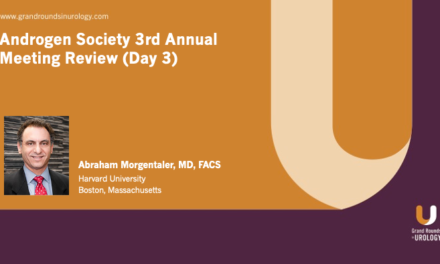Neil H. Baum, MD, and Abraham Morgentaler, MD, FACS, presented “Interviews with Icons: Abraham Morgentaler, MD, FACS, and Testosterone Therapy in Clinical Medicine” for the Grand Rounds in Urology audience in February 2023.
How to cite: Baum, Neil H. MD, and Morgentaler, Abraham, MD. “Interviews with Icons: Abraham Morgentaler, MD, FACS, and Testosterone Therapy in Clinical Medicine” February 2023. Accessed Jul 2025. https://grandroundsinurology.com/interviews-with-icons-abraham-morgentaler-md-facs-and-testosterone-therapy-in-clinical-medicine/
Interviews with Icons: Abraham Morgentaler, MD, FACS, and Testosterone Therapy in Clinical Medicine
In his latest interview with iconic physicians in urology, uro-oncology, and related fields, Grand Rounds in Urology (GRU) contributing editor Neil H. Baum, MD, interviews sexual medicine and male infertility specialist Abraham Morgentaler, MD, FACS, on his clinical research and experience using testosterone to treat patients in a number of contexts. Dr. Morgentaler details how, as a biology undergraduate at Harvard, his initial research with the sexual response of reptiles to testosterone led him to a lifetime of interest in hormone therapy. When he began practicing, it was universally acknowledged that testosterone was a direct cause of prostate cancer. Nevertheless, Dr. Morgentaler administered testosterone therapy at patients’ request, noting that they experienced improved sexual function, had better relationships with their partners, and felt better overall. Further study of the initial literature on the topic proved that the link was tenuous. Over the last 30 years, the only link between the hormone and prostate cancer has been in androgen deprivation therapy’s treatment of advanced or metastatic disease. Dr. Baum next asks Dr. Morgentaler to detail his Saturation Theory (PDF warning). Dr. Morgentaler discusses how he noticed that, while lowering testosterone would lower PSA and shrink tumors, raising it above a saturation point of 240-250 ng/dL would not cause any further rise in tumor growth, and may simply reset the baseline for PSA. He notes that additional testosterone only stimulates cancer development at the lowest levels of disease development. The two further discuss the future of testosterone therapy and how its links to prevalent diseases such as diabetes, obesity, osteoporosis, anemia, and even possibly dementia could lead to widespread improvements in quality of life across populations.
Dr. Morgentaler’s latest book is available here: The Truth about Men and Sex.

Abraham Morgentaler, MD, FACS
Men’s Health Boston
Boston, Massachusetts
ABOUT THE AUTHOR
Neil H. Baum, MD, is a Clinical Professor of Urology at Tulane Medical School in New Orleans, Louisiana. He is also a retired urologic surgeon. Additionally, Dr. Baum serves as the Medical Advisor to Vanguard Communications Group. Dr. Baum is the author of Marketing Your Clinical Practice - Ethically, Effectively, and Economically, which is in its 4th edition, has sold over 175,000 copies, and has been translated into Spanish. He also wrote The Complete Business Guide to a Successful Medical Practice, which was published in 2015. Dr. Baum was the columnist for American Medical News for more than 25 years. Dr. Baum also wrote the popular column, “The Bottom Line,” for Urology Times for more than 20 years. He is a requested speaker each year to the Practice Management Seminar for the American Urological Association (AUA), where he discusses techniques for making urology practices more efficient and more productive. He has written more than 9 books on practice management and over 250 peer-reviewed articles on various urologic topics. Dr. Baum is also the medical advisor to Vanguard Communications Group.




